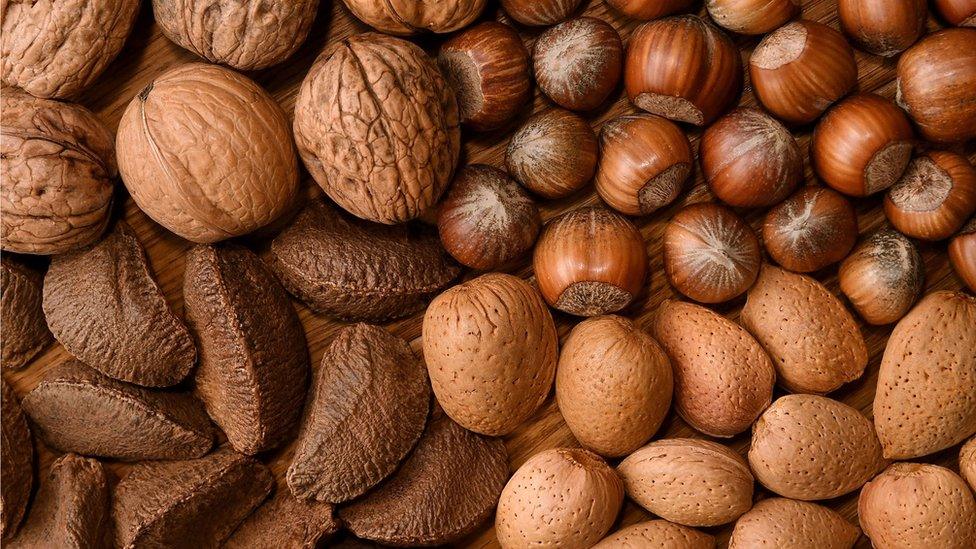Veganuary: Is following a vegan diet for a month worth it?
- Published

Is a vegan diet the nuts?
The Veganuary, external campaign, encouraging people to try a vegan diet for the month most commonly associated with resolution and change, is under way, with a record 50,000 people signed up.
But can forgoing meat, fish, dairy, eggs and honey for 31 days do any good?
The adverts are on display, supporters on board and partner restaurants are promoting their meat and dairy-free dishes.
Campaign organisers say following a vegan diet, even for such a short spell, can bring benefits.
It promotes the animal rights argument - that sentient animals should not be eaten or used in food production. And environmental grounds - warning about the pollution caused by raising animals and as a by-product of agriculture.
But it also says a balanced vegan diet can provide the nutrition people need in concord with health benefits - catchy at a time of year when people look to make up for festive excesses.
What would happen if all the world went vegetarian?
BBC Good Food: A balanced diet for vegans, external
Veganuary spokeswoman Clea Grady told the BBC she feels "brilliant - better than I ever have" as a result of trying, and staying with, a vegan diet.
The charity says the change can lessen obesity, cut blood pressure, and lower the levels of type 2 diabetes.

Cattle might vote for Veganuary
"More than 75 per cent of people who have tried going vegan for a month report an improvement in their health.
"They said they slept better and they lost an average of 6lbs as a result of their changed diet," the Veganuary website says.
So can it?
There is a lot to be said for "strict dietary changes" says Lucy Jones, consultant dietician and spokeswoman for the BDA, the Association of UK Dieticians.
"If people follow a restricted diet, they think about what they're eating - you can no longer pop into the office and eat a biscuit or a cake."
They tend to "plan their meals in advance, prepare and cook from scratch".
"It is certainly possible to have an awful diet. But, as a vegan, you tend to have more plant proteins, beans and pulses and more fruit and vegetables," she says.
"We have to be cautious about what you can achieve. But having a month where you are eating more fruit, vegetables and nuts can't be a bad thing."

Proponents say it's a time for change
Veganuary can lead to changed eating habits throughout the year.
Will all those greens and pulses have an impact on pounds and pressures?
"The impact on blood sugars is fairly immediate, cholesterol takes a few weeks and blood pressure takes longer, and comes with the weight loss," says Lucy.

All burgers, and all dinners, are not created equal
But nutrition therapist Vanessa Kahler urges caution.
There's a bias in play after years of being told meat, eggs and animal fats are bad for us, she says.
Nutrients a-plenty
"There is a world of difference between hamburgers and hot dogs, fried eggs and pasteurised milk, versus grass-fed organic meat, pastured poultry, poached organic eggs and raw, or at least organic, dairy," she says, touching on the continuing debate about the benefit of organic foods.
"Vegan is a plant-based diet with high vegetables but also large amounts of cereal grains (both refined and unrefined) and legumes, both of which are low in bio-available nutrients and high in anti-nutrients such as phytate.
"On the other hand wholefood animal produce such as organic meats, fish and shellfish and eggs are among the most nutrient-dense foods you can eat," she explains.
Vegans can run low on minerals and vitamins like B12, iron, zinc, D and calcium - in fact the Veganuary website points towards supplementing B12, external to ensure it's covered.
And, whereas some studies show vegans and vegetarians living longer, she says, they often include people who pursue other healthy lifestyle traits, like exercise and not drinking alcohol, comparing them with the junk food-lovers.
No doughnuts
In January, both experts observe that anyone going from Christmas excess to a vegan diet plus exercise will feel different.
But Kahler warns they can become nutrient-deficient down the line.
"People use the words 'balance' and 'in moderation' as a cover to incorporate whatever they want in their diet. Moderation isn't the key to health," she says.
"Setting boundaries is the key along with an understanding that there are certain 'foods' - like fizzy drinks and doughnuts - that we consume which simply should not be labelled with the word 'food'".